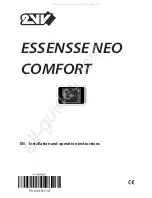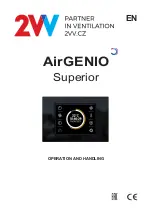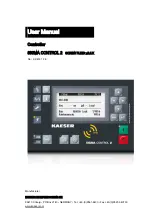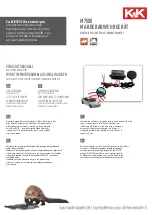
CONTROLLO ZONE FZ4B
103
cod. FZ4B - 06/2011 (Rev. 00)
EN
The Delay for Zone timer (TSP29) starts: during this time the relay of card SK must be unpowered.
The Mixing Valve Boost timer (TSP20) starts: during this time RY2 must be powered and RY3 must be unpowered.
d. If the Delay for Zone timer (TSP29) is less than the Mixing Valve Boost timer (TSP20), the Delay for Zone timer (TSP29) must be equal to the Mixing Valve Boost
timer (TSP20).
e. At the end of Mixing Valve Boost timer (TSP20), the Zone1 mixing valve adjustment algorithm must start; and this while RT1 remains in request status. The aim of the
microprocessor is to adjust the valve so that the temperature detected by sensor T1 is equal to the Control Setpoint value calculated from Remote Control. Therefore:
- If the temperature detected by sensor T1 is equal to the Control Setpoint value calculated from Remote Control, RY2 must be unpowered and RY3 must be unpowered.
- If the temperature detected by sensor T1 is higher than the Control Setpoint value calculated from Remote Control, RY2 must be unpowered whereas RY3 must be
powered according to the following rule: (temperature detected by sensor T1 - Control Setpoint value calculated from Remote Control) * Mixing valve On Time timer
value for °C (TSP21) each time the Mixing valve On+Off Time timer (TSP19) has expired.
- If the temperature detected by sensor T1 is lower than the Control Setpoint value calculated from Remote Control, RY3 must be unpowered whereas RY2 must be
powered according to the following rule: (Control Setpoint value calculated from Remote Control - temperature detected by sensor T1) * Mixing valve On Time timer
value for °C (TSP21) each time the Mixing valve On+Off Time timer (TSP19) has expired
f. At the end of the Delay for Zone timer (TSP29), the Heating standby Time timer (TSP33) must be reset.
If T3 is lower than the Zone card Heating Setpoint value, the relay of card SK must be powered.
If T3 becomes higher than the Zone card Heating Setpoint value plus the Heating Hysteresis value (TSP32), the relay of card SK must be unpowered and, at the
same time, the Heating standby Time timer (TSP33) must start.
At the end of the Heating standby Time timer (TSP33), if T3 is lower than the Zone card Heating Setpoint value, the relay of card SK must be powered, otherwise
the latter will be powered as soon as T3 is lower than the Zone card Heating Setpoint value.
g. If RT1 deactivates the request, the relay of card SK must be unpowered; RY2 must be unpowered, RY3 must be powered for the entire duration of the Mixing valve
closing Time timer (TSP31); whereas RY1 must remain powered for the entire duration of the Post-circulation Time timer (TSP27); at the end of this timer, RY1 must
be unpowered.
6.8 “ONE MIXED ZONE – WITH EXTERNAL SENSOR”
Autocon
fi
guration:
Connection
Description
7
Pump phase (RY1)
Mixed zone 1
8
Pump neutral (RY1)
Mixed zone 1
9
Mixing Valve Opening phase (RY2)
Mixed zone 1
10
Mixing Valve neutral (RY2)
Mixed zone 1
11
Mixing Valve Closing phase (RY3)
Mixed zone 1
19
On/Off Thermostat or Remote Control (RT1)
Mixed zone 1
20
On/Off Thermostat or Remote Control (RT1)
Mixed zone 1
25
NTC sensor (T1)
Mixed zone 1 delivery
26
NTC sensor (T1)
Mixed zone 1 delivery
29
NTC sensor (T3)
Heating delivery
30
NTC sensor (T3)
Heating delivery
30
NTC sensor (T4)
External probe
31
NTC sensor (T4)
External probe
X15
Card SK connected
6.8.1 On/Off Thermostat
The algorithm remains the same as the con
fi
guration: 6.7 “ONE Mixed Zone – No External Sensor”.
What changes is only the calculation of Zone1 Heating Setpoint if the sliding temperature was activated.
a. If Zone 1 External Probe Curve (TSP05) is equal to 0.
Zone1 Heating Setpoint = Zone1 Max. Temperature (TSP02) + Zone1 calculated setpoint Offset (TSP03).
b. If Zone 1 External Probe Curve (TSP05) is between 1 and 10.
Zone1 Heating Setpoint = Setpoint calculated from External Probe + Zone1 calculated setpoint Offset (TSP03).
However:
If Zone1 Max. Temperature (TSP02) < Setpoint calculated from External Probe then Setpoint calculated from External Probe = Zone1 Max. Temperature (TSP02).
6.8.2 Remote Control
The algorithm remains the same as the con
fi
guration: 6.7 “ONE Mixed Zone – No External Sensor”.
What changes is only the calculation of Zone1 Heating Setpoint if the sliding temperature was activated.
a. If Zone 1 External Probe Curve (TSP05) is equal to 0.
Zone1 Heating Setpoint = Control Setpoint calculated from Remote C Zone1 calculated setpoint Offset (TSP03).
b. If Zone 1 External Probe Curve (TSP05) is between 1 and 10.
Zone1 Heating Setpoint = Setpoint calculated from External Probe + Zone1 calculated setpoint Offset (TSP03).
However:
If Zone1 Max. Temperature (TSP02) < Setpoint calculated from External Probe then Setpoint calculated from External Probe = Zone1 Max. Temperature (TSP02).
If Control Setpoint calculated from Remote Control < Setpoint calculated from External Probe then Setpoint calculated from External Probe = Control Setpoint cal-
Summary of Contents for FZ4B
Page 292: ......
















































